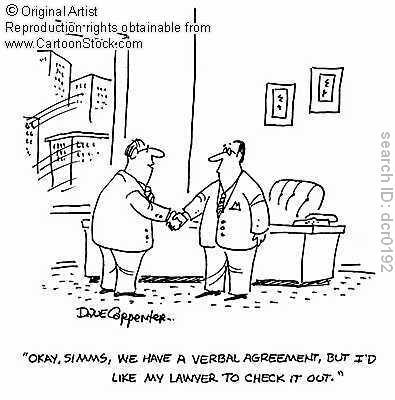The
first step in accomplishing a successful and profitable business arrangement is
recognizing the importance of agreement, prior to starting any service.
Establishing a mutually agreed upon written contract, that includes all
aspects of a working relationship, protects you as the consultant, as well as
the client.
Due to trial and error in the beginning of my Fundraising Career, I only continue with a client past the “project introduction phase”, once I have a signed agreement, and here’s a tip: I suggest you do the same. Why, because when information is shared, resources are expended and dilemmas arise, the client expects specified results, both parties involved with the project are fully aware of the terms & conditions, and you are not providing a free service.
Due to trial and error in the beginning of my Fundraising Career, I only continue with a client past the “project introduction phase”, once I have a signed agreement, and here’s a tip: I suggest you do the same. Why, because when information is shared, resources are expended and dilemmas arise, the client expects specified results, both parties involved with the project are fully aware of the terms & conditions, and you are not providing a free service.
 There
is a reason professionals collaborate to work towards the completion of a
worthwhile endeavor, and before signing a contract, there should already be an
initial level of trust, understanding, commitment and respect of one another
developed in the introductory phase, which makes agreement comfortable and worthwhile.
There
is a reason professionals collaborate to work towards the completion of a
worthwhile endeavor, and before signing a contract, there should already be an
initial level of trust, understanding, commitment and respect of one another
developed in the introductory phase, which makes agreement comfortable and worthwhile.
As a Consultant, I am sure you have met someone over coffee
and agreed to take them on as a new client. Can you have a verbal agreement? My
answer is a direct NO; verbal agreements do not outline the important aspects
of a business relationship.
Please take note:
A written agreement, not signed, is not an agreement. Discuss your services,
terms, fees and expectations; review it with your legal consultant before
committing to sign on the dotted line; print or e-signature.
Still
have questions? Following are three essential areas to include in your
Consultant Agreement to maximize your success.
- Services: Organization hires Consultant to provide the following services. Describe in detail. What am I providing as a Consultant and what are the needs of the client? Are they in Agreement?
- Compensation: Describe hourly rate, daily rate, weekly or project rate. When will client be invoiced, what are the payment terms? Is there a late fee? Attach a current price list with all agreements, as well as methods of payment.
- Term: Every agreement needs a beginning and end date. Is it a yearly contract, project based, or as needed? What are the termination options and penalties of either party? Give all notice in writing.
Agreeing
in business is just that, business; it
is not personal, be it for profit, non-profit, friends or family. Take the time
to evaluate your current consultant agreement or draft a new one if necessary, and
remember the importance of presenting it to all your future clients.
Have you had an experience in business, which would have been easily solved if a written agreement was in place? Please share.
Have you had an experience in business, which would have been easily solved if a written agreement was in place? Please share.
About The Author: Sherree Saperstein is the Director of Development for Saperstein & Associates, a Global Consulting & Fundraising Firm based in the Los Angeles area. She has worked in the Non Profit, Private & Government Sectors raising funds and managing budgets of all sizes for over 15 years.

No comments:
Post a Comment